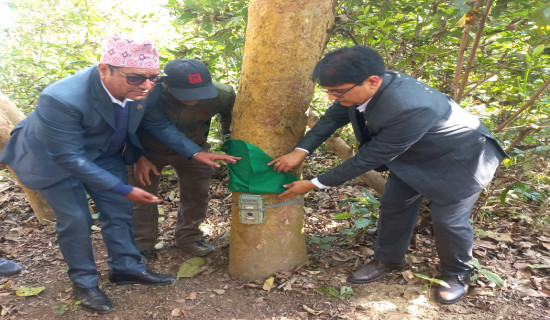- Tuesday, 16 December 2025
Srimad Bhagavata: Treasure Trove Of Social Lessons
Kamal Bhattarai
Srimad Bhagavatam, also known as Bhagavata Purana, is a sacred scripture composed by Sage Ved Vyasa thousands of years ago. It is a comprehensive treatise on spirituality, philosophy, theology, and morality, consisting of twelve cantos with a total of 18,000 verses. The scripture narrates the divine pastimes of Lord Vishnu and his incarnations, along with teachings from sages, saints, and devotees. In addition to its spiritual and philosophical value, Srimad Bhagavatam offers valuable social lessons that are relevant in contemporary society. This article will explore these lessons, analyse their significance, and provide recommendations for shaping a better, more harmonious, and more enlightened society.
Equality
One significant lesson from the Srimad Bhagavatam is the principle of equality and brotherhood. The text teaches that a person with wisdom and knowledge sees all beings with the same level of respect and consideration. This principle promotes social harmony, tolerance, and mutual respect among individuals and communities. It discourages discrimination based on caste, gender, or religion, which are major causes of social conflict, and inspires compassion, inclusivity, and the avoidance of violence. It also serves as a basis for social justice, empowering marginalised communities, and promoting the welfare of all.
The principle of equality and brotherhood in Srimad Bhagavatam is deeply rooted in the understanding that the soul is divine and exists within all living beings. This principle advocates for unity and equality, combating egoism and possessiveness that cause division and conflict. By realising our spiritual identity and connecting with the Supreme Lord, we can overcome these delusions and foster a spirit of equality and fraternity. This principle ensures social harmony, tolerance, and mutual respect among individuals and communities. It also promotes compassion and inclusivity towards all living beings, regardless of their species. Furthermore, the principle serves as a foundation for social justice, motivating us to challenge inequalities and uplift marginalised communities. Overall, the principle of equality and brotherhood in Srimad Bhagavatam has immense significance in shaping a better, harmonious, and enlightened society.
Respect for nature
One of the significant social lessons we can learn from Srimad Bhagavatam is the importance of respecting nature and the environment. In this ancient text, the universe is depicted as a divine creation where every living being, and element has a specific role and purpose. It highlights the interconnectedness and interdependence of all living beings and emphasises the need for balance and harmony in the natural order. Respecting nature and the environment in Srimad Bhagavatam is not just seen as a moral obligation or utilitarian concern. It is deeply rooted in the spiritual understanding of the universe as a divine manifestation and the interplay of the three gunas, namely Satwa guna (goodness), Raja guna (passion), and Tama guna (ignorance), which are the modes of material nature. According to the text, every living being and element in the universe has a specific purpose and contributes to greater harmony and balance.
This understanding can inspire us to view the environment not as a resource to exploit or a commodity to buy and sell but as a sacred entity to cherish and protect. It can motivate us to adopt sustainable and eco-friendly lifestyles, conserve natural resources, reduce our carbon footprint, and mitigate the impacts of climate change. Moreover, the text teaches us about the interconnectedness and interdependence of all living beings in the natural world. It reminds us that those lacking hands are prey for those with hands, and those lacking legs are prey for those with four legs. This teaching highlights the universal ruling that one living being becomes food for another, emphasising the importance of non-violence and compassion towards all creatures. It also reminds us of our responsibility as humans to protect and conserve the environment. Another important teaching in Srimad Bhagavatam is that the Supreme Personality of Godhead pervades everything in this world in His manifested form. This spiritual dimension of the natural world implies the unity of all living beings as manifestations of the Supreme Lord. It suggests that disrespecting or exploiting nature and animals is equivalent to disrespecting and harming the divine presence within them. Therefore, the text emphasises the mutual respect, interconnectedness, and interdependence of all living beings in the natural world.
Importance of education
Srimad Bhagavatam places a strong emphasis on the significance of education and learning for spiritual and intellectual growth. According to this ancient text, the ultimate goal of human life is the spiritual quest, and knowledge is the key to attaining it. The text emphasises the need for holistic and practical education that encompasses not only academic and technical knowledge but also moral values, ethical principles, and life skills. It showcases the teacher-student relationship as sacred and respectful, encouraging lifelong learning and intellectual curiosity. These teachings offer valuable guidance for the present-day education system, which often prioritises degrees and careers over the holistic development of individuals. It encompasses the cultivation of moral and ethical values, the development of emotional intelligence, and the pursuit of spiritual knowledge. This understanding inspires us to rethink our current education system, which often focuses on rote learning and exam-oriented approaches disconnected from real-life applications. Instead, we are encouraged to promote holistic and experiential education, nurturing qualities such as creativity, critical thinking, compassion, and empathy. True education, according to the text, involves acquiring knowledge through study, preserving it through memory, and practicing it through action. This underscores the idea that education should lead to self-realisation and detachment from material attachments, rather than solely pursuing worldly
success or pleasure.
It emphasises the study of scriptures and the guidance of a guru as essential for acquiring true knowledge. These teachings demonstrate that true education involves not only gathering information but also cultivating a moral and spiritual outlook that guides one's actions and attitudes. By studying and applying the wisdom found in these scriptures, individuals can gain a comprehensive understanding of the nature of reality and the purpose of human existence.
Role of women
The significance of women and family values in Srimad Bhagavatam can be seen in its recognition of the impact of social relationships on personal and societal well-being. This sacred text teaches us that the family is the fundamental unit of society, providing love, security, and support. It also emphasises the role of women as custodians of domestic harmony and cultural heritage. However, it is important to note that this recognition does not imply the subordination or marginalisation of women, nor does it impose rigid gender roles and norms. On the contrary, Srimad Bhagavatam portrays many women as independent, courageous, and wise individuals who challenge patriarchal norms and contribute to the welfare of society. Despite the patriarchal and conservative nature of ancient society, Srimad Bhagavatam contains numerous references and stories that highlight the invaluable role of women and promote family values. The text presents female characters as heroic, intelligent, and devoted, playing significant roles in supporting and guiding their husbands, sons, and society at large. Moreover, the text underscores the sanctity and importance of family life as the foundation of social order and stability. It encourages virtues such as love, compassion, forgiveness, and sacrifice among family members and emphasises the duty of parents to instill proper moral and spiritual values in their children. In the present scenario, where family values are eroding, crime and social unrest are on the rise, and gender-based violence and discrimination persist, this aspect of Srimad Bhagavatam holds
great significance.
The concept of a family consisting of a wife, husband, and children can be compared to the teamwork of bullocks yoked to a plough, which enables the farmer to plough a farming field and receive a good harvest. This underscores the importance of family values and the multifaceted role of women as leaders, managers, caretakers, and nurturers of family life. It suggests that a harmonious and loving family environment is essential for individual and societal well-being, as well as spiritual growth. This perspective not only emphasises the general significance of women as caretakers and nurturers but also recognises their vibrant leadership in family life.
Srimad Bhagavatam is a treasury of social lessons that remain pertinent and vital in today's society. These teachings encompass principles of equality, brotherhood, reverence for nature, the significance of education, and the role of women and family values. By embracing and implementing these teachings, we can establish a more harmonious and enlightened society that embodies the profound ideals and values of our ancient wisdom and culture. These lessons are diverse, deep, and applicable, offering us a vision of a society rooted in spirituality, morality, and humanity rather than materialism, individualism, and consumerism. They equip us with the necessary tools and insights to confront the complex challenges and seize the opportunities of our era, ultimately forging a better world for ourselves and future generations. Imbibing and practicing these lessons empowers us to cultivate a society that reflects the highest ideals and values of our ancient wisdom and culture, contributing to the well-being and happiness of all.
(Bhattarai is a Joint Secretary with the Government of Nepal)















